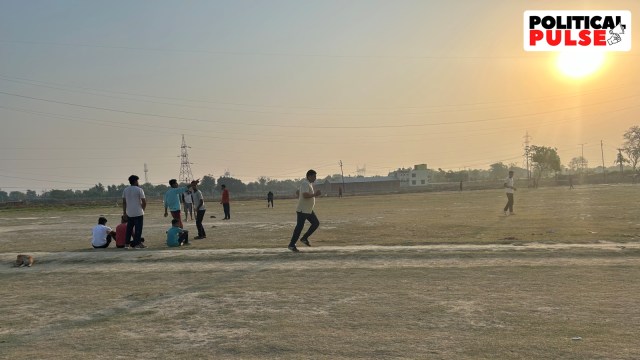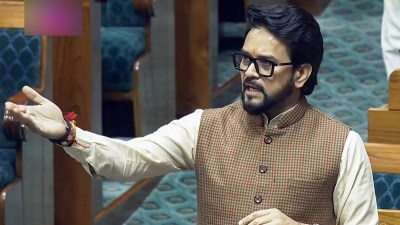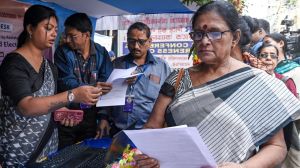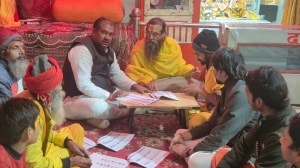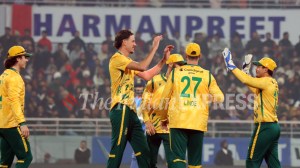While caste is one of the major drivers of the electoral discourse and voting patterns in India, for several youngsters in Uttar Pradesh’s Prayagraj district unemployment and the Agnipath recruitment scheme are at the top of their agenda. This is apparent in the Phulpur Lok Sabha seat, which votes on Saturday, and comprises five of the 12 Assembly segments in Prayagraj district: Allahabad North, Allahabad West, Soraon, Phaphamau, and Phulpur.
Phulpur is a high-profile Lok Sabha constituency that has been represented by stalwarts such as Jawaharlal Nehru, his sister Vijaya Lakshmi Pandit, and former Prime Minister V P Singh. In recent years, among those who have represented it in the recent past are gangster Atiq Ahmed (won in 2004 on a Samajwadi Party ticket), who was shot dead last year while being taken to a court-mandated medical check-up, and current Uttar Pradesh Deputy CM Keshav Maurya who won in 2014. Five years ago, the BJP’s Kesari Devi Patel clinched the seat by 1.71 lakh votes.

To maintain its hold on the seat this time, the BJP has fielded Phulpur MLA Praveen Patel who is from the dominant Kurmi community. Of the 20 lakh voters in Phulpur, the most are Kurmis at 3 lakh, followed by around 2.5 lakh Muslims, two lakh each of Yadavs and Brahmins, and approximately 3.5 lakh Dalits divided into two subgroups, and around 1.5 lakh Mauryas. Other communities such as Vaishyas and Binds also play a decisive role here.
To counter the BJP’s Kurmi play, the SP has fielded Amarnath Singh Maurya from the Maurya community, and the BSP’s Jagannath Pal is from the shepherd community. All three candidates are OBCs, giving the decisive vote to upper castes such as Brahmins, Thakurs, and Kayasthas. This gives the BJP the edge as far as caste combinations are concerned.
But the Opposition will be hoping that the caste arithmetic is trumped by the issues that concern the 35,000 students at various university-college campuses and others who come to prepare for competitive exams in Prayagraj, most of whom come to the city from different corners of Uttar Pradesh to prepare for competitive exams. While several are voters in Phulpur, many, even if they are not, are important in the sense that the issues that concern them may end up determining the poll narrative in their hometowns or villages.
What the youth are saying
In the villages around Prayagraj city, the youth flag issues with the Agniveer scheme. During the 2022 Assembly polls, before the Agnipath scheme was rolled out, The Indian Express visited the villages of Kotwa and Soraon to observe young men training for Army recruitment. But now both the villages bear a deserted look.
In Kotwa, Akash Singh, 21, a Rajput, was selected as an Airman in the Air Force. However, before the call letter was issued, the Agnipath scheme was introduced. Akash says there are an estimated 27,000 voters in surrounding villages who come to train at the village ground.
Story continues below this ad
“You can see the practice ground is empty because they have the least interest in becoming Agniveers. Few have joined from here but they are not happy. We are going to vote for Rahul Gandhi and Akhilesh Yadav only due to their promise of abolishing Agnipath and giving employment,” he says.
Ajay Maurya from Kotwa echoes Akash. “Before Agnipath, around 200 people used to train here. They used to come from villages such as Malkhanpur, Baraipur, Jamunipur, Dalapur, Lilapur Kalan, Lilapur Khurd, and Katwaripur,” he says, adding that six of his friends were selected as Agniveers but are “unhappy”.
Others like Kushal Yadav, 24, who are “disappointed” with the scheme say many have left for Mumbai and other cities to work in private factories. With the Army no longer the desired route, many are appearing for other competitive exams. Kushal, who was also training others at the ground, appeared in the police constable recruitment exam this February but it was rescheduled after the question papers were believed to have been leaked.
After finishing his run at the Soraon ground, Ravi Kumar Pal says, “We are disturbed about unemployment. The least these governments can do is to hold fair examinations on time. No one in my village will vote for the BJP this time.”
Story continues below this ad
Swagat Patel, a civil engineer in his twenties exercising at the ground, says, “Everyone here is against the BJP. We have forgotten caste. Our community voted for the BJP last time. This time we will not vote for them.”
But 26-year-old Sandeep Kumar who runs a mobile shop in Soraon differs with the others. Despite the resentment, caste will ultimately decide votes. “The youth here are very angry with the present government. But everyone’s family is going to vote based on their caste. Kurmis will vote for the BJP as the candidate is a Kurmi, Pals will vote for the SP as it has appointed Pal as its state president, Yadavs will vote for the SP and Vaishyas and other upper castes will vote for the BJP,” he says.
The BJP’s Prayagraj city president Rajendra Mishra admitted that students were unhappy over the jobs issue but claimed that a majority of them were not voters in Prayagraj. “Their annoyance will not affect our results here. Our candidate will win, there is no doubt about it,” he said.

